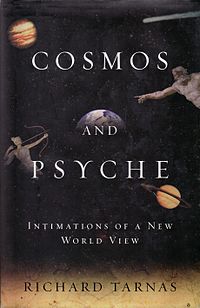Cosmos and Psyche

Cover of the first edition
|
|
| Author | Richard Tarnas |
|---|---|
| Country | United States |
| Language | English |
| Subject | Astrology |
| Published | 2006 (Plume) |
| Media type | Print (hardcover and paperback) |
| Pages | 569 |
| ISBN | |
Cosmos and Psyche: Intimations of a New World View is a 2006 book by cultural historian Richard Tarnas, in which Tarnas proposes the existence of relationships between planetary transits and events in the lives of major historical figures, as well as cultural events.
Tarnas's first book, The Passion of the Western Mind serves as an introduction to Cosmos and Psyche. Tarnas acknowledges that astrology's status in contemporary thought is, as he puts it, "the gold standard for superstition".
The book's objective is to challenge the materialistic and dysteleological assumptions of the modern world view, and to set forth evidence for a correspondence between planetary alignments and patterns of human history. The book attempts to provide an archetypal cosmology to accompany Tarnas's proposed participatory epistemology, "in which human beings are regarded as an essential vehicle for the creative selfunfolding of reality".
The idea for Cosmos and Psyche began when Tarnas realized that the climax of the 1960s cultural revolution took place precisely during the only Uranus-Pluto conjunction in the 20th century. For Tarnas, the characteristics of the astrological entity Uranus match with those of the Greek mythical figure Prometheus better than with those of the conservative mythological figure Uranus. Tarnas associates the astrological planet Uranus with freedom and change, while Pluto is associated with evolution, instinct, and eros. Thus in Tarnas's theory, the apparent relationships (conjunctions, oppositions, and squares) of Uranus and Pluto have momentous potential for human history. (Tarnas's research has not found significant correlation between the zodiac signs and human events.) Tarnas further observed that a Uranus-Pluto opposition occurred during the French Revolution. Like the 1960s, the French Revolution featured the characteristics of Uranus-Pluto alignment: revolution through the manifestation of the suppressed. These historical-astrological coincidences or synchronicities led Tarnas to further explore the relationship of pivotal moments in Western cultural history to the conjunctions, oppositions, and squares of the outer planets. The historical events analyzed include the Reformation, the Renaissance, Romanticism, the Scientific Revolution, the Industrial Revolution, Modernism, Postmodernism, etc.
...
Wikipedia
